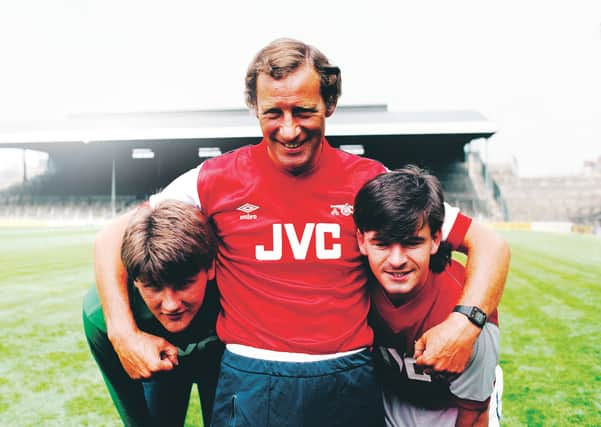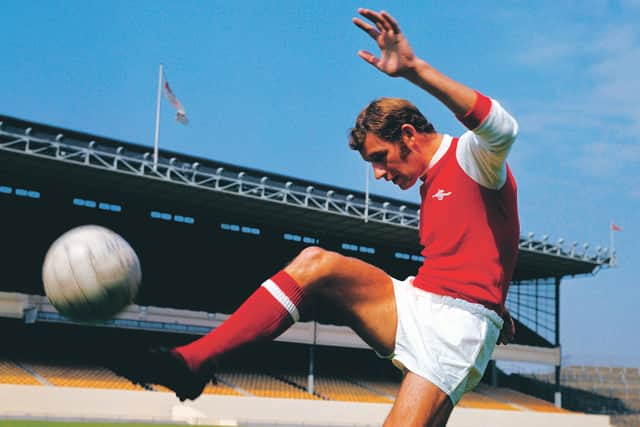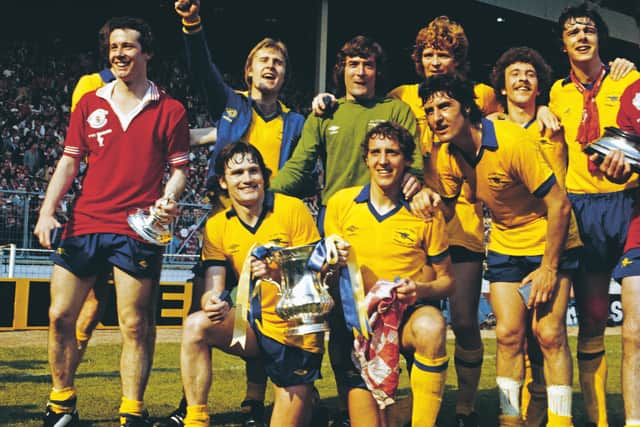Terry Neill on going the extra mile to take Celtic’s Charlie Nicholas to Arsenal


After being informed of Steven Davis’s comments that he’s still a little too young and inexperienced to start thinking about the vacant Northern Ireland post, the chuckle down the phone line from Sussex is deep, resonant and brimful of warmth.
“Listen, you tell Steven from me not to worry about that – he ought to slip into my shoes,” says Terry Neill with reference to the Rangers midfielder. Listen? Neill’s rich Irish brogue compels rapt attention over the course of more than an hour of conversation.
Advertisement
Hide AdAdvertisement
Hide Ad“I became player-manager of Northern Ireland at 29 and I was already player-manager at Hull as well,” he continues. “The Troubles were at their height. I was getting death threats and getting little packages to my office in Hull. I had to have the mirror under the car, all that kind of stuff. I was player-manager of Hull and Northern Ireland and I was still wet behind the ears. It was crazy really – but I could not say no.”


It is mid-afternoon. Neill is just back from getting soaked after walking to the chemist to pick up a prescription for his wife, Sandra. He himself opts for a different sort of medication.
A crate of wine to mark his 78th birthday last Friday has arrived from Washington, where his daughter Tara, who read English at Dundee University in the early 1990s, is deputy bureau chief for the BBC. “I’ve just poured myself a nice glass of Rioja,” he says prior to settling down to discuss a remarkably precocious career.
Neill, whose other daughter Abigail lives nearby in Sussex, has been away from football’s firing line since Christmas 1983, when he was sacked by Arsenal months after splashing out on the golden boy of football at the time, Charlie Nicholas – more of which later. On visits now to London, it’s almost guaranteed that at least one person will stop him and ask: didn’t you used to be Terry Neill?
The ‘five-minute’ final


A debut for Arsenal at 18 and captain at club and international level by 20, such an unintentional slight, reported with wry amusement by Neill, is perhaps understandable. “Maybe I did everything too early, I don’t know!” he says. He left it late in the classic FA Cup final of 1979 between Arsenal and Manchester United, replayed yesterday evening on ITV – or at least his side did. Dubbed the ‘five-minute final’, Arsenal threw away a 2-0 lead in the final four minutes of regulation time before Alan Sunderland grabbed a dramatic winner in the dying seconds.
Arsenal lost two goals shortly after Neill replaced midfielder David Price with defender Steve Walford, the former Celtic coach, and he knew who would get the blame.
“I should have won an Oscar,” he says of his acting as he tried to keep calm in the knowledge the cameras were on him after compatriot Sammy McIlroy scored Manchester United’s equaliser.
“United manager Dave Sexton was my coach as a player at Arsenal, I owed him so much,” says Neill now. “I apologised at the end to him.”
Advertisement
Hide AdAdvertisement
Hide AdThe famous win was bookended by two final defeats – against Bobby Robson’s Ipswich and, 40 years ago today, second division West Ham United. The latter game is memorable for two reasons: a rare headed goal from Trevor Brooking and Willie Young scything down 17-year-old Paul Allen, then the youngest player to appear in an FA Cup final at Wembley, as he looked set to score a fairytale goal to secure victory for the underdogs.
Neill defends Young, his Scottish centre-back. “He apologised to him later. He would have been sent off these days. But Willie was very honest. He said: ‘I knew I was not going to catch him, so I had to bring him down’.”
A few days later, an exhausted Arsenal, playing their 70th game of the season, lost the Cup-Winners’ Cup final to Valencia on penalties, with Graham Rix missing the decisive sudden-death kick.
Neill packed in so much at Arsenal, where he had become – naturally – the club’s youngest ever manager. Mindful of the current climate, he is quick to register his gratitude to the NHS that he was able to make it in football at all. “With the pandemic I want to repay the debt I owe to the NHS in Northern Ireland, who saved my life when I was nine years old,” he says. “I still have the scars right down my stomach from when I had a fall in the scout hall. I ruptured my intestines. If it had not been for their care there would have been no Arsenal, no Northern Ireland, no nothin’.”
It was a Friday night. His parents had treated themselves to a rare night out at the cinema. “There were no stretchers so they transferred me up the road on an old door. My sister, Phyllis, was very helpful. She kept screaming: ‘don’t die, don’t die!’ I can remember every bump in the ambulance to the Belfast Royal Victoria.”
Working with the Doc
He went on to play for Bangor while serving an engineering apprenticeship. “One Saturday night, Malcolm Brodie, the old legend, in his page in the Belfast Telegraph – I was sneaking a look to see if I had a decent report playing for Bangor that day – had “Terry Neill for Arsenal”. I never really supported an English team. My family, who were from east Belfast, were all Glentoran people. But the Glens did not seem to fancy me.”
He made his debut in December 1960 at Sheffield Wednesday. “George Swindin must have felt like he’d hit the jackpot. He signed me for £2,500 from Bangor and I scored on my debut up there.” Neill had taken Tommy Docherty’s place in the side. Tricky, as the Scot had been one of his mentors. “My first thought was, the Doc ain’t gonna be too pleased here,” he says. “He’d taken me under his wing, you see.”
Just over a decade later, Neill returned the favour. Appointed player-manager at Hull City at the age of just 28, he needed someone to lean on. No better man than the Doc, who had just finished a stint in charge of Porto. “I’d heard a whisper that if Tommy came back into the game and kept his nose clean, he’d get the Scottish job. I asked if he would come and help me at Hull.’
Advertisement
Hide AdAdvertisement
Hide Ad“I owed Tommy a lot of favours. He was so good and kind to me. I see he was 92 a week ago – you can’t keep a good man down!
“His last game with us was a pre-season friendly at the old Boothferry Park. We were playing the Japan international team. Just into the second half, I hear a murmur around the crowd. I was playing and looked over towards the dugout to see Tom, who never lost his sense of humour, holding up a number. My number! I took the corners, the penalty kicks and everything! OK, I think, it’s only a friendly. As I walk over to the bench I look across at Tom, who has the biggest grin on his face. I said: ‘You’re fired!’ And he was like: ‘Too late, I’ve got the Scottish job and I’m leaving’. I gave him a big hug.”
They were to meet again soon afterwards – as opposing managers at Hampden Park in May 1972 in a Home International fixture. Neill lined up for the visitors, The Doc looked on from the dugout and George Best was AWOL as Scotland earned a 2-0 win through late goals from Denis Law and Peter Lorimer.
Three days later, with Best still absent (he was later discovered to have booked himself into a hotel in Marbella), Neill scored a famous winner as Northern Ireland defeated Sir Alf Ramsey’s England 1-0 at Wembley.
“I said after the game, the only regret we have tonight is that George is not with us,” he says. “Even that night we were thinking of him and his welfare. We all loved George. We still do. He was quiet, shy but very articulate and intelligent before the sideshow – and I had a ringside seat for that. I felt a bit helpless. There was not much else I could do. He had started to have a lot of hanger ons. Understandably, because he was a genius.
“He came from the same part of east Belfast as my family. His father Dickie was a delightful man, who knew my dad quite well. When George went AWOL now and again there would be no criticisms from within the Northern Ireland squad. We all thought the world of George.”
How I signed Charlie Nicholas
Such sensitive treatment of a wayward superstar perhaps helped facilitate Neill’s recruitment of a player who, in the summer of 1983, was cast as the new George Best – Celtic’s Charlie Nicholas.
No one truly expected Arsenal to win the race for the hottest property in British football in the face of competition from Liverpool and Manchester United. But Neill went the extra mile to secure the signature of a player who had scored 48 goals for Celtic the previous season.
Advertisement
Hide AdAdvertisement
Hide AdWhile Liverpool, already blessed with Kenny Dalglish and Ian Rush, never appeared to truly pull out the stops for Nicholas, Manchester United, whose manager Ron Atkinson was a bit of a flash Harry, looked the likelier destination for the striker.
“Ah, but I had a few ‘mafia’ pals up there in Glasgow,” explains Neill. “I knew what Charlie was eating for breakfast, lunch and tea. What he was doing, where he was going.
“I enlisted a bit of help and advice from Jock Stein, who became a great friend over the years. I had a few conversations with the Big Man.”
Stein, the then Scotland manager, seemed to act as Nicholas’ unofficial agent, specifically in the days prior to a game with England at Wembley in May 1983, when the Scots were based at a hotel in Hertfordshire.
“I rang Jock at the hotel and I said: ‘would it be possible to have ten or 15 minutes with Charlie if I popped up to the hotel?’ I was living in Hertfordshire then and the Arsenal training ground was just 15 minutes down the road from their hotel. Everyone knew there were three of us vying for Charlie’s signature. And Jock said, ‘you know what, you are the only one from any of the clubs to have the decency to ring me’.”
Atkinson had already visited the hotel – uninvited. “Jock said: ‘Bojangles was down! He did not even have the decency to give me a ring!’” continues Neill.
“Jock was brilliant. He said: ‘you can pick up the boy at 9pm at the back of the hotel. I know your training ground is just down the road – why don’t you take him and show him around there? And you can take him for a lager afterwards – but only one. Have him back at a reasonable time’.
“I was not going to be one to disobey big Jock. You didn’t cross the Big Man.”
Advertisement
Hide AdAdvertisement
Hide AdWith Neill in Indonesia on a club tour, Arsenal secretary Ken Friar travelled to Glasgow to clinch the £750,000 – and a bit – deal between clubs with strong ties at the time.
“Typical of the Celtic board then, they did not hold an auction: the price was the price,” says Neill. “Ken took a shilling out of his pocket and put it on the table and said, ‘gentlemen I think this takes our bid above the others’. He swears to me to this day that they took it!”
Of course, Neill is too much of a gentleman to exhibit any sense of wishing the deal had in fact collapsed. But it’s true that his fortunes – including, indeed, the premature termination of his managerial career – were very much wrapped up with Nicholas’ struggles in London. By the time the striker had scored his first league goal at Highbury– in January the following year – Neill was already gone, following a run of four successive defeats.
“He was a good lad, who trained well,” says Neill. “But maybe it was a case of the bright lights of London…
“My wife Sandra has just reminded me of the first time she met him. And Charlie – cheeky Charlie – said: ‘you must have been a good-looking girl when you were younger!’”
A message from the Editor:
Thank you for reading this story on our website. While I have your attention, I also have an important request to make of you.
With the coronavirus lockdown having a major impact on many of our advertisers - and consequently the revenue we receive - we are more reliant than ever on you taking out a digital subscription.
Subscribe to scotsman.com and enjoy unlimited access to Scottish news and information online and on our app. With a digital subscription, you can read more than 5 articles, see fewer ads, enjoy faster load times, and get access to exclusive newsletters and content. Visit https://www.scotsman.com/subscriptions now to sign up.
Advertisement
Hide AdAdvertisement
Hide AdOur journalism costs money and we rely on advertising, print and digital revenues to help to support them. By supporting us, we are able to support you in providing trusted, fact-checked content for this website.
Joy Yates
Editorial Director
Comments
Want to join the conversation? Please or to comment on this article.